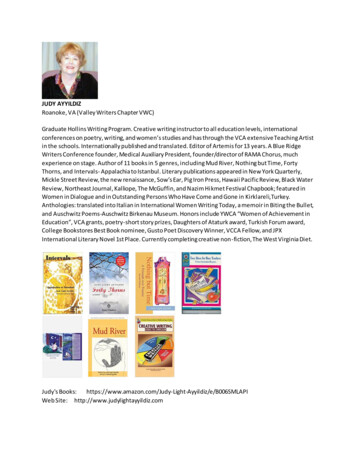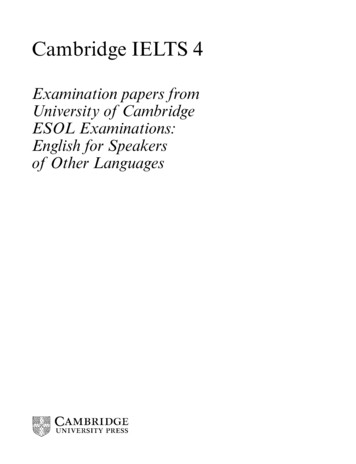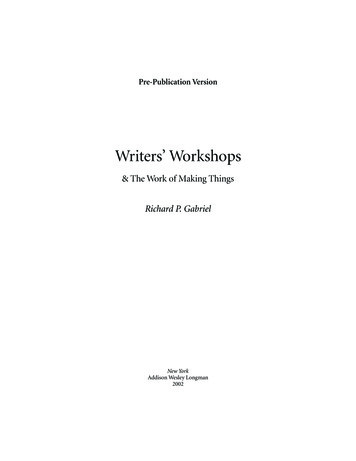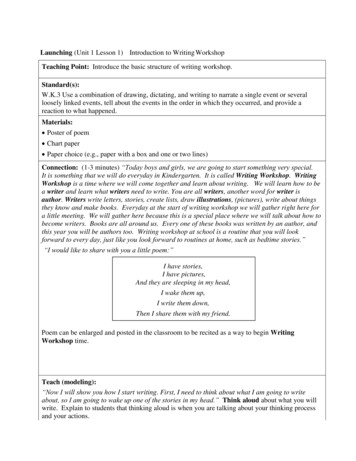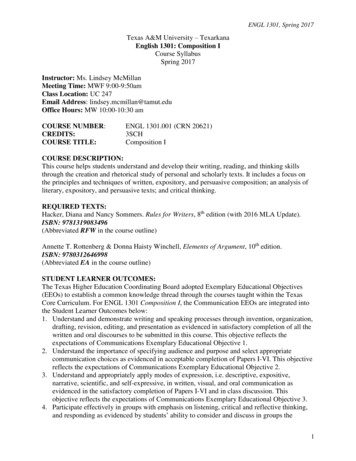
Transcription
ENGL 1301, Spring 2017Texas A&M University – TexarkanaEnglish 1301: Composition ICourse SyllabusSpring 2017Instructor: Ms. Lindsey McMillanMeeting Time: MWF 9:00-9:50amClass Location: UC 247Email Address: lindsey.mcmillan@tamut.eduOffice Hours: MW 10:00-10:30 amCOURSE NUMBER:CREDITS:COURSE TITLE:ENGL 1301.001 (CRN 20621)3SCHComposition ICOURSE DESCRIPTION:This course helps students understand and develop their writing, reading, and thinking skillsthrough the creation and rhetorical study of personal and scholarly texts. It includes a focus onthe principles and techniques of written, expository, and persuasive composition; an analysis ofliterary, expository, and persuasive texts; and critical thinking.REQUIRED TEXTS:Hacker, Diana and Nancy Sommers. Rules for Writers, 8th edition (with 2016 MLA Update).ISBN: 9781319083496(Abbreviated RFW in the course outline)Annette T. Rottenberg & Donna Haisty Winchell, Elements of Argument, 10th edition.ISBN: 9780312646998(Abbreviated EA in the course outline)STUDENT LEARNER OUTCOMES:The Texas Higher Education Coordinating Board adopted Exemplary Educational Objectives(EEOs) to establish a common knowledge thread through the courses taught within the TexasCore Curriculum. For ENGL 1301 Composition I, the Communication EEOs are integrated intothe Student Learner Outcomes below:1. Understand and demonstrate writing and speaking processes through invention, organization,drafting, revision, editing, and presentation as evidenced in satisfactory completion of all thewritten and oral discourses to be submitted in this course. This objective reflects theexpectations of Communications Exemplary Educational Objective 1.2. Understand the importance of specifying audience and purpose and select appropriatecommunication choices as evidenced in acceptable completion of Papers I-VI. This objectivereflects the expectations of Communications Exemplary Educational Objective 2.3. Understand and appropriately apply modes of expression, i.e. descriptive, expositive,narrative, scientific, and self-expressive, in written, visual, and oral communication asevidenced in the satisfactory completion of Papers I-VI and in class discussion. Thisobjective reflects the expectations of Communications Exemplary Educational Objective 3.4. Participate effectively in groups with emphasis on listening, critical and reflective thinking,and responding as evidenced by students’ ability to consider and discuss in groups the1
ENGL 1301, Spring 2017weaknesses and strengths of example compositions, including those written by classmembers and professional writers.5. Understand and apply basic principles of critical thinking, problem solving, and technicalproficiency in the development of exposition and argument as evidenced in the satisfactorycompletion of Papers I-VI.6. Develop the ability to research and write a documented paper and give an oral presentationbased on that paper. This objective reflects the expectations of Communications ExemplaryEducational Objective 6.7. Apply the conventions of edited American English in all written and oral discourse related tothis course.In summary, students are expected to write and edit effective academic discourse, supported byappropriate and varied sources. In researching sources, students will learn to search andincorporate appropriate material in both print and electronic formats. Additionally, students willuse methods of critical thinking and logical reasoning to evaluate, analyze, and synthesizeinformation.PREREQUISITES: None.JUSTIFICATION: This three-hour course partially fulfills the core curriculum requirement forsix hours in Communication.COURSE OUTLINE: This course includes the following areas of focus: (1) practice in a closereading of a substantial number of argumentative essays and identifying the characteristics ofeffective discourse through discussion and writing summaries of selected essays; (2) practice inwriting expository and argumentative discourse.METHODS OF INSTRUCTION:Methods of instruction in this course seek to develop students’ analytical skills in reading and torefine their written skills in producing effective academic discourse. To that end, the courserequires a substantial number of writing activities as well as written and oral analyses of highlyregarded examples of argument.COURSE REQUIREMENTS & MEANS OF EVALUATION:To pass this course, students must1. Complete all major writing assignments, including the final in-class essay;2. Submit all Short Writing Assignments (SWAs) and Major Writing Assignments (MWA)2, 3, and 4 to TurnItIn.com;3. Submit an end-of-the-term progress statement;4. Submit proof of meeting student success requirements (tutoring or writing studio); and5. Earn a “C” or better as a final grade for the course.ASSIGNMENTS:NOTE: Your course instructor may require you to submit any or all assignments viaBlackboard. Submission preferance varies from instructor to instructor, and submissionrequirements are at the discretion of your instructor. Ask your instructor if you have questionsabout how to submit your assignments.2
ENGL 1301, Spring 2017Chapter QuestionsTo ensure you comprehend the underlying rhetorical principles tackled in this course, you willhave questions to answer over each chapter reading from our primary textbook. Each assignmentwill have a different point value based upon the number of questions asked. Responses must betyped, double-spaced, and consist of complete sentences/answers. Chapter Questions must behanded in at the beginning of class to receive full credit. Point values for each of the chapterquestion assignments are as follows:Chapter 2A Questions – 10 pointsChapter 9A Questions – 5 pointsChapter 2B Questions – 5 pointsChapter 9B Questions – 10 pointsChapter 2C Questions – 10 pointsChapter 9C Question – 5 pointsChapter 1 Question – 10 pointsChapter 4A Questions – 10 pointsChapter 5A Questions – 10 pointsChapter 4B Question – 5 pointsChapter 5B Question – 5 pointsChapter 3 Questions – 20 pointsChapter 8A Questions – 15 pointsChapter 10A Questions – 10 pointsChapter 8B Question – 5 pointsChapter 10B Questions – 10 pointsChapter 6A Questions – 15 pointsChapter 10C Questions – 5 pointsChapter 6B Questions – 10 pointsChapter 11 Questions – 20 pointsChapter 6C Question – 5 pointsTotal points available to be earned from Chapter Questions: 200 pointsShort Writing Assignments (SWAs)Short Writing Assignments (SWAs) are designed to get you thinking about and interacting withthe expository and persuasive readings that accompany our chapters (addressing course SLOs 1,2, 4, 5, and 7). The directions for each SWA varies, so be sure to read the instructions carefully.Students will be asked to summarize, evaluate, and/or analyze all or particular elements of one ora pair of readings. You are required to submit 6 SWAs during the term, all of which should betyped, double-spaced, and a minimum of 250 words (although to fully answer the prompt, youmay need to go beyond that minimum). Failure to meet the 250-word minimum will result in azero for the assignment.Direct quoting from the original readings should be used minimally, with purpose, and citedappropriately using MLA guidelines. All SWAs should be submitted to Turnitin.com by11:59pm the evening prior to the final in-class due date (for due dates, see the course schedulethat follows).Each SWA is worth 25 points and will be graded based on effort, development, adherence todirections, and usage of acceptable standard American academic English.Total points available to be earned from SWAs: 150 pointsSWA 1:Summarize and respond to Sam Walter Foss’ “The Calf-Path” (in-class handout).Your response should include both a summary and a personal response thatoutlines your interpretation of the poem (that is, what is the poem REALLY aboutand why is that message important?).SWA 2:Summarize and discuss the strengths and weaknesses of the arguments presentedin “Racial Profiling at the Airport: Discrimination We’re Afraid to Be Against”3
ENGL 1301, Spring 2017by Michael Kinsley (pp. 19-21) or “The Hard Truth of Immigration” by Robert J.Samuelson (pp. 30-31) using the principles of summary and evaluation outlined inEA Chapter 2 (pp. 48-51) and RFW Chapter 6 (pp. 91-102).SWA 3:Identify and evaluate at least two claims in “The Rich Get Richer, the Poor GoHungry” by Sharon Astyk and Aaron Newton (pp. 580-582) based on theprinciples and strategies presented in chapter 5 in EA.SWA 4:Read Patricia A. Bauer’s “A Movie, a Word, and My Family’s Battle” (118-121)and Christopher M. Fairman’s “The Case Against Banning the Word ‘Retard’”(121-125). Then write an evaluative essay about which of the two arguments youfind more convincing and why (based on principles reviewed in chapters 5 & 8 inEA).SWA 5:Evaluate the authors’ argument(s) in terms of logic and support in “Cheap Food:Workers Pay the Price” (601-616) based on the principles and strategies presentedin chapters 6 and 8 in EA.SWA 6:Evaluate the effectiveness of Roger D. McGrath’s language in his essay, “A GodGiven Natural Right” (p. 380), based on the principles and strategies presented inchapter 9 in EA.Other Graded AssignmentsThroughout the semester, you’ll complete several other graded assignments and activities. Theseassignments include the presentation required for MWA 4 (25 points) as well as any others yourinstructor assigns throughout the course. Point values may differ from assignment to assignmentand can take place during class as in-class activities/assignments or outside of class ashomework. OGA activities need not be announced ahead of time; class attendance andparticipation are vital. In total, 100 points will be allocated to these other graded assignments.Major Writing Assignments (MWAs)This course includes five Major Writing Assignments (MWAs). Two of the essays will be timedand completed in-class. Each MWA varies in length and in points available, and a separateprompt will be issued for each. Minimum length requirements are designed to guide writers toproduce developmentally-sound essays and do not include Works Cited pages or openingauthorial material; students must adhere to these guidelines to receive credit for the assignment.All out-of-class MWAs (2, 3, and 4) must be submitted to Turnitin.com by 11:59pm theevening prior to the final due date (for exact dates, see syllabus).MWA 1: Personal, reflective essay (timed, in-class); 500 words – 100 pointsMWA 2: Evaluative Essay; 600 words – 150 pointsMWA 3: Comparative Evaluation; 850 words – 250 pointsMWA 4: Research-based Persuasive Essay; 1250 words – 300 pointsMWA 5: Personal, reflective essay (timed, in-class); 500 words – 100 pointsFinal Progress StatementStudents should prepare a progress statement (at least 800 words) explaining what writingimprovements have been made throughout the semester using evidence from the in-class4
ENGL 1301, Spring 2017assignment completed week 1 and MWA 1 as comparisons. Submit this to the instructor for agrade on the final day of class (see course schedule for details).Total points available to be earned from the Final Progress Statement: 50 pointsOVERVIEW OF TOTAL POINTS POSSIBLE: Chapter Questions200 points SWAs150 points Other Graded Assignments100 points MWAs900 points Final Progress Statement50 pointsTotal Possible: 1400 pointsGRADING SCALE:1255-1400 points A1115-1254 points B975-1114 points CBelow 975 earned points Student must retake ENGL 1301CLASS POLICIES:AttendanceAttending class is to your advantage. I am not responsible for reminding you to attend class orfor providing you with material if you miss class. If you miss more than four days during thesemester, you seriously endanger your ability to master the course material, participate inimportant class activities, and possibly miss critical assignment due dates. If you know you willmiss class for a legitimate reason (medical appointment, sick child, funeral, etc.), then speakwith/email me ahead of time, so we can make arrangements for you to submit work early for fullcredit.Homework is collected at the beginning of class. You must attend the full class period to submitany assignments due that day. You may not send it with another student, email it to me in lieu ofa hardcopy, or submit it at the beginning of class and then leave. Students are expected to dealwith each other and the instructor in a professional, courteous manner.There will be no cell phone use during class time. If you have an emergency and are expectinga phone call, notify your professor before class begins, set your phone to vibrate, then leave theroom to talk on your phone.Student Success RequirementThe English program believes student writers can better hone their writing skills when theydedicate time to the writing process and have the opportunity to discuss their writing with others.Therefore, this course includes a mandatory student success requirement for Major WritingAssignments (MWAs) 2, 3, and 4. The student success requirement can be met in one of twoways for each MWA, and you do not have to choose the same option for each of the three papersrequired:Option 1: Meet with a Writing Tutor in the Success CenterMake an appointment to meet with a writing tutor in the SC to review and discuss yourrough draft prior to submitting your final draft. Tutoring appointments should take place5
ENGL 1301, Spring 2017at least five days prior to the paper’s final due date, in order for you to allow enough timeto revise your paper based on the work you accomplish together. If you elect this optionbut fail to meet with a tutor within this period, you will lose the points dedicated to theStudent Success requirement per your MWA rubric. Meeting with a tutor from the SC isnot punitive; writers should be open to feedback from other writers in the process ofimproving the effectiveness of their messages. Take your tutoring appointment seriously;you should be adequately prepared with enough material in order to gain the most fromyour time with the tutor. If your tutor does not feel you are prepared for or engagedduring your appointment, he or she may decide NOT to issue you the Proof Sheetrequired for you to obtain the points you need.Option 2: Attend a Writing Studio SessionInstead of meeting one-on-one with a writing tutor, you may elect to attend a writingstudio session for 60 minutes in order to meet your student success requirement. If youelect this option, you must attend one writing studio session related to that MWA. ForMWA 2, you may attend a studio during weeks 4, 5, or 6; for MWA 3, you may attend astudio during weeks 8, 10, or 11; and for MWA 4, you may attend a studio during weeks12, 13, or 14. After your studio session, you will be issued a proof sheet; submit thisproof sheet with your final paper packet in order to receive those points. (See the WritingStudios section below for more information).Writing StudiosWriting Studios will be held weekly on Tuesdays and Wednesdays from 4:00-6:00pm in UC324. Writing Studios include a brief overview or lesson by Writing Studio Leaders (Englishgraduate students) followed by a time for you to write on your own. During your independentwriting time, you may ask the Studio Leaders (and any additional tutors available in that session)for assistance. Writing Studios are not individual tutoring sessions; thus, students may notmonopolize a tutor or Studio Leader for any length of time. Writing Studios are designed to giveyou (1) a dedicated place and time to write and (2) advice from experts when you need it.You may attend writing studios during the week to receive extra credit. For each weekly sessionyou attend, you can earn 10 points toward your semester total. You may only earn a maximum of10 points per week (even if you attend both the Tuesday and Wednesday sessions) and amaximum of 50 points for the full semester. Please note: If you elect to use the WritingStudio option to meet the Student Success requirement for your MWA 2, 3, or 4, thosesessions do NOT count for bonus points (since you’ll be receiving credit for attending viathe grade on your final paper). If the days/times of the Writing Studios do not fit with yourclass schedule for the semester, alternative options are available to you. Please visit with the SCCoordinator, Mr. Ben Lindsay (blindsay@tamut.edu), for assistance. Note: there are no sessionsduring the first week of the term, spring break week, or finals week.Academic IntegrityAcademic honesty is expected of students enrolled in this course. Cheating on examinations,unauthorized collaboration, falsification of research data, plagiarism, and undocumented use ofmaterials from any source, constitute academic dishonesty. Any submitted assignmentsdiscovered to have violated academic integrity will be grounds for a grade of "F" in thecourse and/or further disciplinary actions. For additional information see the universitycatalog.6
ENGL 1301, Spring 2017Academic Integrity Addendum: All work you submit for this course must be original workcompleted for this course during this semester. If you are repeating this class, you mustconstruct new and original work for your assignments, even if the assignments are similar or thesame from previous semesters. Submitting work that you’ve completed previously is unethicaland unfair to other students in the course.TurnItIn.comThis course uses the program, Turnitin.com, as a way to identify unoriginal material and deterplagiarism in assignments. All SWAs and MWAs 2, 3, and 4 must be submitted to theappropriate assignment area in TurnItIn.com by 11:59 pm the evening prior to the assignment’sdue date. If your assignment has not been submitted to TurnItIn.com by this deadline, itwill not be graded and will be recorded as a zero (0).I use TurnItIn.com to make comments on your short and long papers and send you feedback. Iwill show you in class how to find this feedback.If you experience any technical difficulties with TurnItIn.com, please contact their help desk(provided on the website). I strongly encourage you to view the available tutorials on theTurnItIn.com website to ensure you know how to locate assignments, upload documents, viewyour originality reports, and my comments for your essays.If you have previously registered with Turn It In 1. Log in to your account at www.turnitin.com2. At the top, the second tab should say “Enroll in a Class.” Click that.3. When prompted, enter our class ID # 14305275 and the enrollment password –spring20174. Click “submit”5. Click on our class – Comp 1 McMillan to see the list of assignmentfolder.6. When you’re ready to submit an assignment, click on the blue “Submit” button thatcorresponds to that assignment7. Enter in your submission title, upload your document from your computer or flash drive,and submit your assignment.If you have NOT previously registered with Turn It In 1. Visit the website at www.turnitin.com2. Up at the top right, click on “Create Account”3. Select “Student” from the three options at the bottom under “Create a New Account”4. Include the class ID # ( 14305275) and enrollment password ( spring2017 )and the other information you’re asked for. Remember to use your TAMUT emailaddress. Create your account password, secret question, and agree to the terms andyou’re all set!5. Click on our class –Comp 1 McMillanto see the list ofassignment folders6. When you’re ready to submit an assignment, click on the blue “Submit” button thatcorresponds to that assignment7. Enter in your submission title, upload your document from your computer or flash drive,and submit your assignment.7
ENGL 1301, Spring 2017Disability AccommodationsStudents with disabilities may request reasonable accommodations through the A&M-TexarkanaDisability Services Office by calling 903-223-3062.Drop PolicyTo drop this course after the census date, a student must complete a Drop/Withdrawal RequestForm, located on the University Registrar’s webpage or obtained in the Registrar’s Office. Thestudent must submit the signed and completed form to the instructor of each course indicated onthe form to be dropped for his/her signature. The signature is not an “approval” to drop, butrather confirmation that the student has discussed the drop/withdrawal with the faculty member.The form must be submitted to the Registrar’s office for processing in person, emailRegistrar@tamut.edu, mail (7101 University Ave., Texarkana, TX 75503) or fax (903-2233140).Drop/withdraw forms missing any of the required information will not be accepted by theRegistrar’s Office for processing. It is the student’s responsibility to ensure that the form iscompleted properly before submission. If a student stops participating in class (attending andsubmitting assignments) but does not complete and submit the drop/withdrawal form, a finalgrade based on work completed as outlined in the syllabus will be assigned.Drop/Withdraw deadlines for the Spring 2017 semesterSessionDrop without a gradeLast day drop/withdrawFull Term (16 week)Tuesday, January 24Friday, April 14Course calendar begins on the next page.8
ENGL 1301, Spring 2017Course Calendar, Spring 2017The instructor reserves the right to alter the course calendar in any way deemed appropriatebased upon the needs of the course and its students. Students will be notified of any changes tothis calendar.WEEK 1: Welcome to English 1301Wednesday, Jan. 18 Instructor, student, and course introductions Syllabus reviewHomework Review the syllabus and course calendar; come to class Friday with any questions.Friday, Jan. 20 In-class Writing Assignment: My History as a Writer (ungraded)Homework SWA 1: Summarize and respond to Sam Walter Foss’ “The Calf-Path” (in-classhandout). Your response should include both a summary and a personal response thatoutlines your interpretation of the poem (that is, what is the poem REALLY about and whyis that message important?).WEEK 2: Critical Reading & SummarizingMonday, Jan. 23 SWA 1 due – 25 points Discussion of “The Calf-Path” Introduce MWA 1 & discuss expectations and preparing for timed writing assignments Sign Student AgreementHomework Read Chapter 2, “Critical Reading” (in EA, pp. 35-49) Complete Chapter 2A Questions Prepare for MWA 1Wednesday, Jan. 25 Chapter 2A Questions due – 10 points MWA 1 (timed, in-class essay) – 100 pointsHomework Read Chapter 2, “Critical Reading” (in EA, pp. 50-61) Complete Chapter 2B Questions Read Chapter 6, “Reading and Writing Arguments” (in RFW, pp. 91-102)Friday, Jan. 27 Chapter 2B Questions due – 5 points Chapter 2 Discussion: Summary, Evaluation, and Analysis Summary Practice Activity (Writing Summaries handout)Homework Read Chapter 2, “Critical Reading” (in EA, pp. 62-75)9
ENGL 1301, Spring 2017 Complete Chapter 2C QuestionsSWA2: Summarize and discuss the strengths and weaknesses of the argumentspresented in “Racial Profiling at the Airport: Discrimination We’re Afraid to BeAgainst” by Michael Kinsley (pp. 19-21) or “The Hard Truth of Immigration” byRobert J. Samuelson (pp. 30-31) using the principles of summary and evaluationoutlined in EA Chapter 2 (pp. 48-51) and RFW Chapter 6 (pp. 91-102).WEEK 3: Critically Evaluating TextsMonday, Jan. 30 SWA 2 due – 25 points Chapter 2C Questions due – 10 points Chapter 2 Discussion: Evaluating a reading (Writing Evaluations handout) Article Evaluation Checklist (handout) Introduce MWA 2Homework Read Chapter 1, “Approaches to Argument” (in EA, pp. 3-22) Start reading all essays on the list for MWA 2Wednesday, Feb. 1 Discussion: Approaches to Argument, rhetorical triangleHomework Read Chapter 1, “Approaches to Argument” (in EA, pp. 23-32) Complete Chapter 1 Question Finish reading all essays on the list for MWA 2Friday, Feb. 3 Chapter 1 Question due – 10 points Discussion: Approaches to Argument, Toulmin modelHomework Read Chapter 5, “Claims” (in EA, pp. 170-183) Complete Chapter 5A Questions Select an essay to evaluate for MWA 2 and critically read it (i.e., annotate the text) Read Section 1c, “Draft a working thesis” (in RFW, pp. 14-18)WEEK 4: Identifying Claims & Evaluating LogicMonday, Feb. 6 Chapter 5A Questions due – 10 points Practice: Developing a Working Thesis for MWA 2Homework Read Chapter 5, “Claims” (in EA, pp. 184-199) Complete Chapter 5B Questions SWA 3: Identify and evaluate the claim(s) in “The Rich Get Richer, the Poor GoHungry” by Sharon Astyk and Aaron Newton (pp. 580-582) based on the principlesand strategies presented in chapter 5 in EA.Wednesday, Feb. 8 Chapter 5B Question due – 5 points10
ENGL 1301, Spring 2017 SWA 3 due – 25 points Practice: Identifying, evaluating, and making claimsHomework Read Chapter 8, “Logic” (in EA, pp. 297-318) Complete Chapter 8A Questions Complete the Article Evaluation Checklist for your MWA 2 essayFriday, Feb. 10 Chapter 8A Questions due – 15 points Completed Article Evaluation Checklist – (OGA) Logical Fallacies activityHomework Read Chapter 8, “Logic” (in EA, pp. 319-337) Complete Chapter 8B Question Complete your review of MWA 2 essay and solidify your major evaluative points SWA 4: Read Patricia A. Bauer’s “A Movie, a Word, and My Family’s Battle” (118121) and Christopher M. Fairman’s “The Case Against Banning the Word ‘Retard’”(121-125). Then write an evaluative essay about which of the two arguments you findmore convincing and why (based on principles reviewed in chapters 5 & 8 in EA).WEEK 5: Evaluating Logic & SupportMonday, Feb. 13 Chapter 8B Question due – 5 points SWA 4 due – 25 points Discussion: assigned readings & logical developmentHomework Read Chapter 6, “Support” (in EA, pp. 202-215) Complete Chapter 6A Questions Read Section 1d “Draft a Plan” (in RFW, pp. 19-22) Outline essay for MWA 2Wednesday, Feb. 15 Chapter 6A Questions due – 15 points Outline for MWA 2 due – 5 points Discussion: SupportHomework Read Chapter 6, “Support,” (in EA, pp. 215-238) Complete Chapter 6B Questions Read Section 1e “Draft an introduction” (in RFW, pp. 22-24) Read Chapter 3 “Building effective paragraphs” (in RFW, pp. 49-64) Start drafting MWA 2Friday, Feb. 17 Chapter 6B Questions due – 10 points Writing effective introductions & body paragraphsHomework Read Chapter 6, “Support,” (in EA, pp. 238-268) Complete Chapter 6C Question11
ENGL 1301, Spring 2017 Finish drafting MWA 2 (typed rough draft of at least two pages due in classMonday)WEEK 6: Evaluating LanguageMonday, Feb. 20 Chapter 6C Question due – 5 points Rough draft of MWA 2 due in class Peer review for MWA 2 – (OGA)Homework Read Chapter 9, “Language” (in EA, pp. 339-356) Complete Chapter 9A Questions Revise and polish MWA 2 SWA 5: Evaluate the authors’ argument(s) in terms of logic and support in“Cheap Food: Workers Pay the Price” (601-616) based on the principles andstrategies presented in chapters 6 and 8 in EA.Wednesday, Feb. 22 ***last day for you to visit the SSC to get your points for MWA 2 Chapter 9A Questions due – 5 points SWA 5 due – 25 points Making connections for the reader (using transitions & writing conclusions)Homework Read Chapter 9, “Language” (in EA, pp. 357-372) Complete Chapter 9B Questions Finalize MWA 2 (due Monday)Friday, Feb. 24 Chapter 9B Questions due – 10 points Discussion: LanguageHomework Read Chapter 9, “Language” (in EA, pp. 373-385) Complete Chapter 9C Question Finalize MWA 2 (due Monday)WEEK 7: DefinitionsMonday, Feb. 27 MWA 2 DUE – 150 points Chapter 9C Question due – 5 points Practice: Evaluating LanguageHomework Read Chapter 4, “Definition” (in EA, pp. 131-145) Complete Chapter 4A Questions SWA 6: Evaluate the effectiveness of Roger D. McGrath’s language in his essay,“A God-Given Natural Right” (p. 380), based on the principles and strategiespresented in chapter 9 in EA.Wednesday, March 1 Chapter 4A Questions due – 10 points12
ENGL 1301, Spring 2017 SWA 6 due – 25 pointsDiscussion: Using definition(s) as a rhetorical deviceHomework Read Chapter 4, “Definition” (in EA, pp. 145-169) Complete Chapter 4B QuestionFriday, March 3 Chapter 4B Question due – 5 points Introduce MWA 3 & discuss expectations Finding companion pieces for MWA 3 (research tips/database)Homework Read Chapter 3, “Analytical Writing” (in EA, pp. 76-92) Complete Chapter 3 QuestionsWEEK 8: MLA WeekMonday, March 6 Chapter 3 questions due – 20 points Developing analytical claims and synthesizing source materialHomework Read “Citing sources; avoiding plagiarism” (in RFW, pp. 441-445) Review MWA 2 and identify opportunities for revision (Improvement Loghandout) Select and evaluate your companion essay for MWA 3 (Article EvaluationChecklist due Friday)Wednesday, March 8 MLA document formatting & style Citations and the Works Cited pageHomework Start outlining/planning for your MWA 3; outline due Monday Read “Documenting sources in MLA style” (in RFW, pp. 458-512)Friday, March 10 Article Evaluation Checklist due MLA Application activity – (OGA)Homework Continue working on MWA 3 outline (due Monday after Spring Break)WEEK 9: SPRING BREAKNo classes the week of March 13 – 17WEEK 10: Library WeekMonday, March 20 MWA 3 Outline due – 10 points Database Day (meet in computer lab, TBD)Homework13
ENGL 1301, Spring 2017 Continue drafting MWA 3Wednesday, March 22 Library Presentation & tourHomework Continue drafting MWA 3Friday, March 24 Checkup on MWA 3 progress and answer questions Integrating source material: basic and advanced strategies Sign up for student conferences next weekHomework Prepare a rough draft (at least 4 full typed pages) of MWA 3 for your conferencenext weekWEEK 11: Writing ConferencesMonday, March 27 NO CLASS – WRITING CONFERENCESHomework Final paper packet for MWA 3 (due Monday) Read Chapter 6, “Constructing reasonable arguments” (in RFW, pp. 103-111)Wednesday, March 29 ***last day for you to visit the SSC to get your points for MWA 3 NO CLASS – WRITING CONFERENCESHomework Final paper packet
Rules for Writers, 8 edition (with 2016 MLA Update). ISBN: 9781319083496 (Abbreviated RFW in the course outline) Annette T. Rottenberg & Donna Haisty Winchell, Elements of Argument, 10th edition. ISBN: 9780312646998 (Abbreviated EA in
